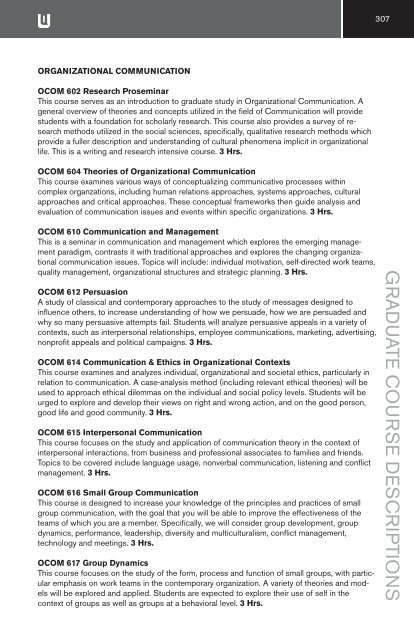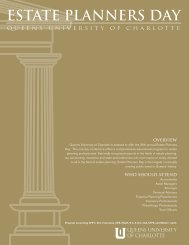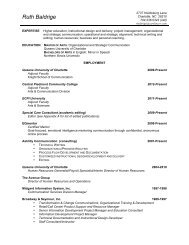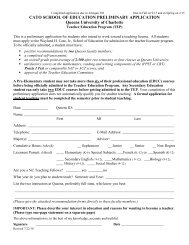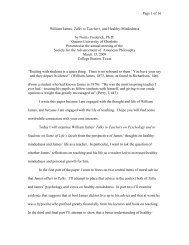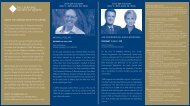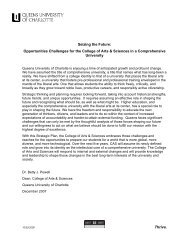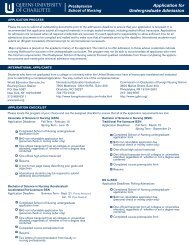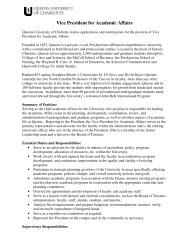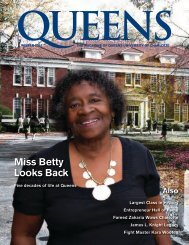2008-2009 Academic Catalog - Queens University of Charlotte
2008-2009 Academic Catalog - Queens University of Charlotte
2008-2009 Academic Catalog - Queens University of Charlotte
Create successful ePaper yourself
Turn your PDF publications into a flip-book with our unique Google optimized e-Paper software.
307<br />
ORGANIZATIONAL COMMUNICATION<br />
OCOM 602 Research Proseminar<br />
This course serves as an introduction to graduate study in Organizational Communication. A<br />
general overview <strong>of</strong> theories and concepts utilized in the field <strong>of</strong> Communication will provide<br />
students with a foundation for scholarly research. This course also provides a survey <strong>of</strong> research<br />
methods utilized in the social sciences, specifically, qualitative research methods which<br />
provide a fuller description and understanding <strong>of</strong> cultural phenomena implicit in organizational<br />
life. This is a writing and research intensive course. 3 Hrs.<br />
OCOM 604 Theories <strong>of</strong> Organizational Communication<br />
This course examines various ways <strong>of</strong> conceptualizing communicative processes within<br />
complex organzations, including human relations approaches, systems approaches, cultural<br />
approaches and critical approaches. These conceptual frameworks then guide analysis and<br />
evaluation <strong>of</strong> communication issues and events within specific organizations. 3 Hrs.<br />
OCOM 610 Communication and Management<br />
This is a seminar in communication and management which explores the emerging management<br />
paradigm, contrasts it with traditional approaches and explores the changing organizational<br />
communication issues. Topics will include: individual motivation, self-directed work teams,<br />
quality management, organizational structures and strategic planning. 3 Hrs.<br />
OCOM 612 Persuasion<br />
A study <strong>of</strong> classical and contemporary approaches to the study <strong>of</strong> messages designed to<br />
influence others, to increase understanding <strong>of</strong> how we persuade, how we are persuaded and<br />
why so many persuasive attempts fail. Students will analyze persuasive appeals in a variety <strong>of</strong><br />
contexts, such as interpersonal relationships, employee communications, marketing, advertising,<br />
nonpr<strong>of</strong>it appeals and political campaigns. 3 Hrs.<br />
OCOM 614 Communication & Ethics in Organizational Contexts<br />
This course examines and analyzes individual, organizational and societal ethics, particularly in<br />
relation to communication. A case-analysis method (including relevant ethical theories) will be<br />
used to approach ethical dilemmas on the individual and social policy levels. Students will be<br />
urged to explore and develop their views on right and wrong action, and on the good person,<br />
good life and good community. 3 Hrs.<br />
OCOM 615 Interpersonal Communication<br />
This course focuses on the study and application <strong>of</strong> communication theory in the context <strong>of</strong><br />
interpersonal interactions, from business and pr<strong>of</strong>essional associates to families and friends.<br />
Topics to be covered include language usage, nonverbal communication, listening and conflict<br />
management. 3 Hrs.<br />
OCOM 616 Small Group Communication<br />
This course is designed to increase your knowledge <strong>of</strong> the principles and practices <strong>of</strong> small<br />
group communication, with the goal that you will be able to improve the effectiveness <strong>of</strong> the<br />
teams <strong>of</strong> which you are a member. Specifically, we will consider group development, group<br />
dynamics, performance, leadership, diversity and multiculturalism, conflict management,<br />
technology and meetings. 3 Hrs.<br />
OCOM 617 Group Dynamics<br />
This course focuses on the study <strong>of</strong> the form, process and function <strong>of</strong> small groups, with particular<br />
emphasis on work teams in the contemporary organization. A variety <strong>of</strong> theories and models<br />
will be explored and applied. Students are expected to explore their use <strong>of</strong> self in the<br />
context <strong>of</strong> groups as well as groups at a behavioral level. 3 Hrs.<br />
GRADUATE COURSE DESCRIPTIONS


